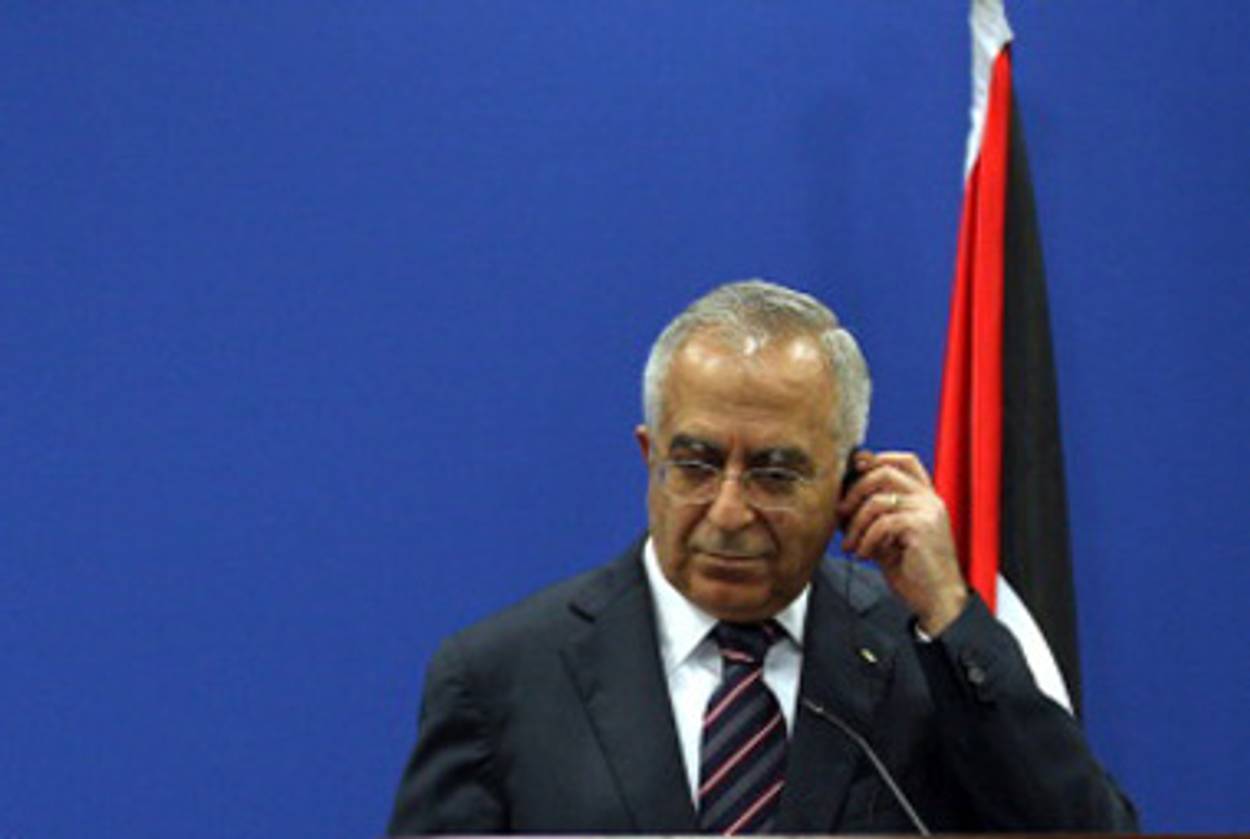Palestinian Unity, Interrupted
Disagreement over Fayyad could be straw that breaks always-tenuous deal




A high-level meeting between Fatah and Hamas scheduled for tomorrow was abruptly canceled over the weekend because they could not agree on the composition of a unity government—chiefly because of President Mahmoud Abbas’s insistence that current prime minister Salam Fayyad run it, and Hamas leader Khaled Meshal’s refusal on that point. (Fayyad, a Western-trained economist, is a member of neither party.) Despite some friendly gestures taken by the two sides, such as Hamas’s halt to violence and Fatah’s dismissal of the hated Muhammad Dahlan, Fayyad may prove the proximate (and convenient) cause for the dissolution of Palestinian reconciliation and subsequent resumption of the Palestinian civil war.
Fayyad’s enigmatic qualities are coming to a head. His tenure has led to undeniable state-building and economic growth; Israeli President Shimon Peres famously labeled him “the Palestinian Ben Gurion.” But a new report indicates that growth was chimerical, and anyways over-relied on authoritarianism and Western collaboration. “The Palestinian Authority, for all its problems, was actually far more ready for statehood on the eve of the Second Intifada in 1999 than it is on the possible eve of the third in 2011,” writes Nathan Brown in Foreign Policy. A new poll finds that 45 percent of Palestinians want Fayyad to remain as prime minister, compared to 22 percent who favor Hamas’s candidate, even while one brand-new report has it that Fayyad (who, among other things, just sustained a heart attack) will announce that he will refuse the posting. And ultimately none of this matters, because none of this will change the mind of Hamas, one official of which said, “Salam Fayyad is a criminal who should be put on trial. He has tortured our people in prison. He is not acceptable to anyone in Hamas.” (Those claims actually appear in ascending order of truthfulness, and the final claim is completely accurate.)
And yet one can’t help but shake the sense that Fayyad is only a pawn in the larger reconciliation game. Fayyad was never going to be PM (a day after reconciliation was announced, Nathan Thrall, a Middle East Analyst with the International Crisis Group, told me this flat-out.) Reconciliation always looked extremely dubious, cobbled together for reasons of pragmatism (Hamas’s need for a new patron in Cairo due to the shakiness of its current one in Damascus; Abbas’s need for unity before the September U.N. vote) rather than principle. The United States will not—indeed, legally cannot—in any way back a Palestinian government that includes Hamas. In April, when the reconciliation deal was announced, Prime Minister Netanyahu’s soundbite was, “The Palestinian Authority has to choose between peace with Israel and peace with Hamas.” That turns out to be not quite true, but mostly so: The P.A. has to choose between continued U.S. support and peace with Hamas. And given how essential U.S. support remains, it is not really a choice at all.
Divided on Premier, Palestinians Cancel Meeting [NYT]
U.N. Agency Report Shows West Bank Economy Not Flourishing [Reuters/Haaretz]
No Savior [Foreign Policy]
Survey: Majority of Palestinians Want Fayyad as Prime Minister [DPA/Haaretz]
Salam Fayyad ‘Will Refuse’ PM Post [Ma’an News Agency]
Aiding Friends and Foes in Palestine [Foreign Affairs]
Earlier: Too Good To Be True?
On Reconciliation, ‘The Devil Is In the Details’
Fatah Chooses Hamas
Marc Tracy is a staff writer at The New Republic, and was previously a staff writer at Tablet. He tweets @marcatracy.